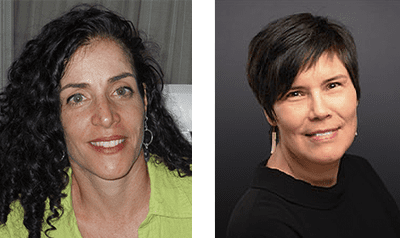Posted By: Kylee Spencer, PhD, Assistant Editor, AJHG
Each month, the editors of The American Journal of Human Genetics interview an author of a recently published paper. This month we check in with Maya (@CPMGatColumbia and @columbiaethics) and Greta to discuss their recent paper “The Need for an Intersectionality Framework in Precision Medicine Research“.
KS: What motivated you to start working on this project?

MS and GG: There’s been much discussion about the underrepresentation of historically marginalized gender, racial and ethnic groups in precision medicine research and the ramification of this underrepresentation for health equity. We are a diverse team, all with roots in community-based work, and thought that there is more complexity in lived experiences. Factors such as disability, gender identity, socioeconomic status, and other sociopolitical characteristics exist within each of these broad underrepresented groups and have confounding impacts on how we live in the world, are treated by others, and subsequently, also participate (or not) in precision medicine research. That led us to start thinking about the voices within marginalized communities that could benefit from being part of precision medicine research efforts but are largely missing.
KS: What about this paper/project most excites you?
MS and GG: We identified a few key areas where we think an intersectional approach to precision medicine research can be helpful and suggest steps that can be immediately implemented to increase inclusivity in such studies. Applying an intersectionality approach to precision medicine research is also an area where there is much room for growth and further research. We think that this combination opens the door for broader policy and methodological discussions about how to create diverse cohorts and promote more equitable outcomes from precision medicine research.
KS: Thinking about the bigger picture, what implications do you see from this work for the larger human genetics community?
MS and GG: This work is only a beginning. It calls for reflection about which communities have not yet been heard in precision medicine research and why they have been overlooked, as well as engagement with such communities, including marginalized communities within marginalized communities, to better understand their views and concerns. We think that if the genetics community engaged in discussions on intersectionality, it could lead to a more diverse genomic workforce and improve our knowledge and implementation of precision medicine research.
KS: What advice do you have for trainees/young scientists?
MS and GG: Trainees and young scientists come with fresh eyes and perspectives. We’d encourage them to stick to their guts and ask questions about the accuracy and usefulness of existing dogmas and categories for inclusion and justice in precision medicine research.
KS: And for fun, tell us something about your life outside of the lab.
MS: There’s nothing like a good, long swim and it’s a regular internal struggle as to when I absolutely must get out of the water.
GG: One of my passions is binge watching sci-fi and mystery series.
